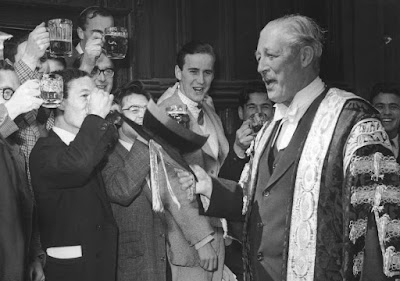Inequality and the British Conservative Party
Many commentators have identified British
Conservatism as an ideology which defends inequality. Since the 1980s, scholars
have associated modern Conservatism with anti-egalitarian beliefs. They argue
that the Conservative party has always advocated socio-economic inequality on
a level which is core to their political identity.
Ideology describes the system of ideas
that form the basis of a political theory. It is about core commitments to foundational
notions. In regard to party ideology, Dean Blackburn, a scholar, writes that inequality
never possessed an ‘independent status within Conservative thought’ (p. 157).
Rather, the main values and features of British Conservatism were always much more
complicated.
Certainly, Conservatives debated the
meanings of social inequality. But, in terms of a fixed and concrete party ideology, inequality
was never a staple of Conservative identity. By describing the shifts and
changes in the post-war Conservative party, Blackburn makes the case that
inequality had a ‘peripheral role’ within their ‘ideological architecture’ (p.
170).
Blackburn argues that Labour’s
landslide victory in 1945 caused a significant shift in Conservative thinking.
Members such as Harold Macmillan and Quintin Hogg re-examined the party’s aims to strengthen their place as the opposition party in government. On this, Blackburn
makes two major points.
 |
| Harold Macmillan at Oxford University, 1960. © The Independent. |
First, Conservative thought depended
on fostering ‘organic forms of change’, rather than a core commitment to inequality
(p. 157). In practice, this meant a renewed focus on the role of community in
British society, viewing it as a living organism as opposed to something absolute.
This new outlook made inequality incongruous with the party’s vision, which
favoured social harmony over distinct division.
Second, contrary to what recent
commentators suggest, Conservatives frequently worked towards alleviating
divides of wealth and status in society. This meant that later Conservatives
were willing to ‘subordinate the defence of social hierarchy to their core
objective of preserving the prerequisites of organic change’ (p. 167).
Conservatives compromised their ideas on inequality to encourage social unity. Consider,
for instance, Timothy Raison, a Conservative politician, who said in 1964 that ‘the
egalitarianism which characterises a good deal of English life is likely to be valuable’
(p. 167). Here, party opinions on inequality were flexible, adjusting themselves
to the needs of the time.
But just because inequality was never
a core commitment of the party does not necessarily mean that inequality was unimportant
to its members. British Conservatism’s post-war development introduced
a heightened philosophical focus on the meanings of social disparity.
Conservatives came up with the idea
that inequality, in an ordered society, was natural. By lines of intelligence,
the natural order of people made the distribution of wealth an expected outcome
of human relations. Private property is a good thing because it enables
individual freedom. Economic productivity depended on a market which
created a disparity in incomes. To the Conservative mind, British society was,
or should aspire to be, a meritocracy. Such a society gave incentive to
personal adventure, the development of new ideas and to individual initiative
(pp 163-64).
Blackburn’s main point is that these arguments, which post-war Conservatism formulated, are not ‘evidence of their core commitment to the defence of inequality’ (p. 164). Through promoting organic change, Conservatives ditched some of these arguments to strengthen the party's standing. The Conservative focus on inequality was subject to change, and thus had a subordinate status in their thoughts.
Source:
Dean
Blackburn, ‘“For We Shall Prejudice Nothing”: Middle Way Conservatism and the
Defence of Inequality, 1945-1979’ Political
Studies, 64 (2015), pp 156-72.


Comments
Post a Comment